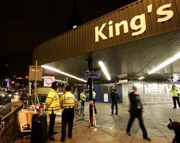|
 |
| British police officer stand guard outside
King's Cross Underground station that was hit by an explosion, in
central London, late Thursday July 7,
2005.(AP) |
Terror struck in the heart of London on Thursday
as explosions ripped through three subway trains and blasted the roof off
a crowded red double-decker bus. At least 37 people were killed and more
than 700 wounded in the deadliest attack on the city since the blitz
in World War
II.
British Prime Minister Tony Blair blamed Islamic extremists and said
the bombings were designed to coincide with the opening in Scotland of a
G-8 summit of the world's most powerful leaders. Foreign Secretary Jack
Straw said the bombings — which came the day after London won the bid to
host the 2012 Olympics — have the "hallmarks of an al-Qaida-related
attack."
Police said there had been no warning and that the blasts at three
subway stations went off within 26 minutes, starting at 8:51 a.m. in an
Underground train just outside the financial district. Authorities
initially blamed a power surge but realized it was a terror attack after
the bus bombing near the British Museum at 9:47 a.m. — less than an hour
after the first explosion.
Trapped passengers in the Underground railway
threw themselves on the floor, some sobbing. As subway cars quickly filled
with smoke, people used their umbrellas to try to break the windows so
that they could get air. Passengers emerged from the Underground covered
with blood and soot
. On
the street, in a light rain, buses ferried the wounded, and medics used a
hotel as a hospital.
"I didn't hear anything, just a flash of light, people screaming, no
thoughts of what it was. I just had to get out of the train," said subway
passenger Chris Randall, 28, who was hospitalized with cuts and burns to
the face, the legs and hands.
"It was chaos," said Gary Lewis, 32, evacuated from a subway train at
King's Cross station. "The one haunting image was someone whose face was
totally black (with soot) and pouring with blood."
It was the attack that Britain had long feared, following al-Qaida's
Sept. 11, 2001, strikes in New York and Washington and Britain's
subsequent alliance with U.S. forces in Afghanistan and Iraq. Thursday's
explosions also recalled the March 11, 2004, terrorist bombs that killed
191 people on four commuter trains in Madrid, at a time when Spain was
part of the U.S.-led coalition in Iraq.
Police were investigating whether suicide bombers
were involved, and said they could not confirm the authenticity of a claim
of responsibility from a group calling itself "The Secret Organization of
al-Qaida in Europe." The group said the blasts were in retaliation
for Britain's
involvement in Iraq and Afghanistan.
In Washington, a senior counterterrorism official said the claim is considered "potentially very
credible" because it appeared on a Web site that in the past
has been used for extremist postings, the message appeared soon after the
attacks and doesn't appeared hurried or rushed.
(Agencies) | 